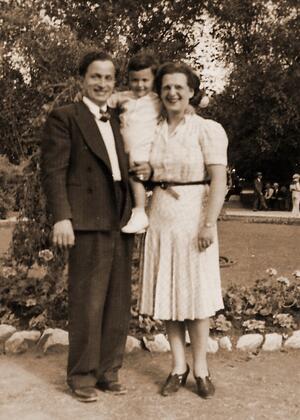A big fish in a small, Canadian town
This piece was written as a part of JWA's discussion of the significance of physical places and spaces in Jewish women's history. Share your stories with us as we get ready to put Jewish women "On the Map."
“My world is much bigger than hers was,” is what I said as I eulogized my Bubbe on a windy, rain-drenched hillside in southern Alberta exactly twelve years ago. Indeed, my life as a professional and working mother was not one to which my grandmother could easily relate, but I also knew that I could never fully understand what it meant to be the kind of Jewish pioneer that she was.
My Bubbe is buried next to my Zaida, who predeceased her, in the Jewish section of Lethbridge’s cemetery. The fact that there are far more Jews lying there than are walking around town today speaks volumes. It will not be long before the gates of the Jewish section will be permanently closed, just like the doors of Lethbridge’s synagogue were a couple of decades ago. The exodus of my father’s generation for the promised lands of Montreal, Toronto, Vancouver, and even nearby Calgary sounded the death knell for the community my Bubbe’s parents, poor, uneducated immigrants from Romania, helped found in the early years of the last century.
My Bubbe, Bertha Moscovitch Ghert, was the first Jewish girl born in Lethbridge. Her arrival in 1912 followed that of her older sister as their parents passed through Montreal on their way west. Two more sisters and a brother were born later. Life was tough for the family, which lived in a shack-like house without electricity or indoor plumbing. From what I have gathered, it was pretty much like a scene from out of Little House on the Prairie, only without a Pa who was handy with tools and livestock and who knew how to provide for his family.
The kids never finished high school, having to leave early to work at Klinger’s, a general store named for its eponymous owner, another member of the Jewish community. My Bubbe, the beauty of the family, eventually married at the age of 25, the only one of her siblings to settle down and have kids. Two sisters married late in life and remained childless, one sister never married, and the lone brother was excommunicated for marrying a divorced non-Jewish woman (I’m pretty sure it was her being a non-Jew, rather than a divorcee that was the problem). I never knew the brother existed until I saw his obituary posted in my Bubbe’s kitchen.
Life could not have been easy for a Jewish girl growing up in a farming and ranching town hundreds of miles from the nearest major Jewish community (when I say “major,” bear in mind that I am talking about the Jewish community in Calgary – not New York- in the 1920’s and 1930’s). Still, there was never any thought that she would leave it. Lethbridge was her home, and she saw no reason to find another. Even in retirement, she and my Zaida never completely left Lethbridge, always returning to it for the spring and summer after wintering in the warmer climes of Honolulu. Core members of the now small city’s dwindling Jewish community, they felt the place needed them as much as they needed it.
My Bubbe’s one permanent foray outside of her hometown ended badly. Finally convinced by family members to sell her house, give away my late Zaida’s possessions and move to Vancouver to be closer to some of her children and grandchildren, she was never able to fully reconcile herself to this self-imposed exile. When she died in a Vancouver hospital, there was never any doubt that she would be returned to be put to rest next to my Zaida in the small, obscure spot on the planet where she began her life eight and a half decades earlier. It was the place that, despite her many travels, she never really left.
My Bubbe would have agreed that my world was much larger than hers, that my being a well-educated professional rather than only a housewife was probably a positive thing. But she may not have been able to fully understand me. I can imagine her standing at the sink in her basement utility room scaling the rainbow trout my Zaida had caught on a fishing trip, telling me that her life, although not perfect, was a good one. “You may be swimming out there in a big Jewish ocean, “ she’d say. “But as for me, it hasn’t been so bad being a big fish in a little pond.”
Renee Ghert-Zand is a writer and Jewish educator who blogs at Truth, Praise & Help: Musings of A Gen X Yiddishe Mamme. She lives in Palo Alto, CA.







My paternal grandmother was born in Edenbridge, Saskatchewan, a small Jewish farming colony started in 1906. This piece brought back warm memories of her and her stories.
...a very nice piece.
Hi ReneeThankyou for writing such a nice article about Baba Bertha. She always considered Lethbridge her home and at times told me that her family was there--in the cemetery! Lethbridge was good to Baba and Zaida (he was well known and like an unofficial mayor) and they were good for Lethbridge. Lethbridge, although always lacking a little in Jewish quantity, made up for it in "quality". It was home for your dad and me and to this day, I do miss some of the warmth it offered and small city caring. People there had (and probably still do) time for others! Yes, Baba's heart never left there.